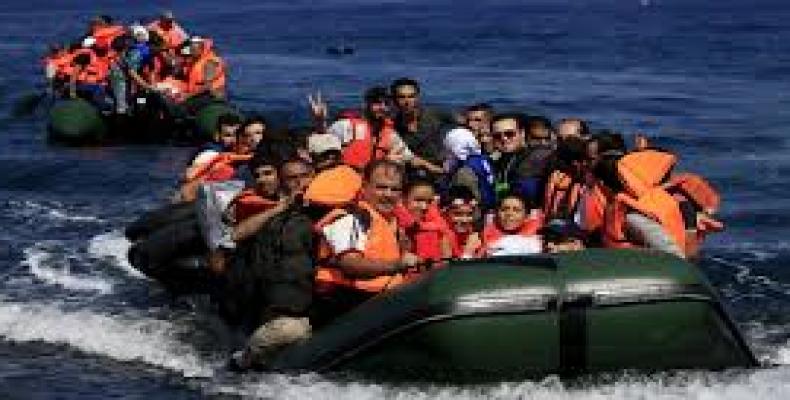Tripoli, November 17 (RHC)-- More than 100 refugees and migrants are lost at sea in the Mediterranean, with only 23 of 122 in a capsized dinghy that disappeared off the Libyan coast — bumping up the death toll Tuesday to almost 4,300 this year.
German NGO Jugend Rettet, whose boat was at the scene, first broke the news, with survivors saying there were children as young as 15, and out of 10 women who were on the boat, only one survived.
Attempts to find any survivors were continuing but were being hampered by very rough conditions and the chances of finding anyone alive appeared slim. The coast guard refused to announce the number of missing.
The death toll in the Mediterranean has surged this year to 4,271 as of Nov. 14, compared to 3,777 in the whole of 2015, according to the International Organization for Migration.
Arrivals to Italy this year, now at about 167,000, have already exceeded last year's 154,000. While last year departures dropped off from October as the weather conditions worsened, this year the decline has been less pronounced, Interior Ministry data shows.
Numbers began dropping dramatically following a March deal between Turkey and the European Union to crack down on migrants and refugees arriving from Turkey to Greece via the Aegean Sea.
While it was presented as a solution to the refugee crisis — the continent’s biggest since World War II — the deal appears to have worsened the plight of many asylum seekers, who are now being pushed to travel the far riskier option of crossing the Mediterranean from North Africa.
The most dangerous route has been between Libya and Italy, where the U.N. has recorded one death for every 47 arrivals this year. Meanwhile, for the much shorter Turkey to Greece route, the likelihood of drowning was one in 88, UNHCR said.
The agency explained that death rates have spiked despite a nearly a two-thirds drop in total migration because smugglers are "often using lower quality vessels — flimsy inflatable rafts that do not last the journey."
Smugglers also appear to be packing increasing numbers of people on boats, possibly to drive up profits, the UNHCR added. Shipwrecks involving more people have reduced rescue rates, the agency added, also noting that several disasters this year have been linked to poor weather conditions.
The European Parliament tried to push for humanitarian visas on Monday as “a political wish to open new legal avenues for safe access to the EU for persons seeking international protection, to prevent dangerous journeys and loss of lives as witnessed during the last years (of the) migration crisis,” according to EU documentation. The visas would require processing before the refugee makes the trip to Europe, but the council and commission—the other two decision-making bodies—staunchly oppose the proposal.
More than 100 Missing in Mediterranean, Setting Refugee Death Toll Record


